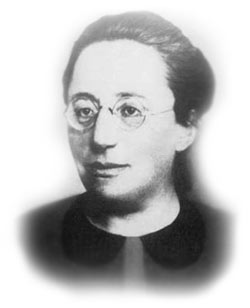The Emmy Noether Research Institute for Mathematics
History of the CenterMode of OperationPublications Resulting from ENI SupportA video about ENI , produced by WEBSEDGE and broadcasted in Rio during ICM 2018. |
History of the Center
The Emmy Noether Institute was founded in 1992. It was established by the Minerva Foundation of Germany, who decided to establish in Israel a Minerva Center in mathematics named after Emmy Noether, one of the greatest scientists of the twentieth century. The Center was thus called the Emmy Noether Mathematical Institute in Algebra, Geometry and Function Theory. The Institute’s goals upon its establishment were to run a visitor program, support international collaborations, organize conferences, and as indicated by the Minerva Foundation, to encourage collaborations between Israel and Germany, host postdoctoral fellows, and to moderately fund local research. Nowadays, it is commonly referred to as the Emmy Noether Research Institute for Mathematics, or, in its abbreviated form, the ENI. The Institute that started as a mainly German-Israeli institute, has developed to foster full scale international collaborations and activities.
General Framework
The Institute is physically located at Bar-IIan University, but it is managed independently, and led by a Director and an Advisory Board, who were appointed jointly by the Minerva Foundation and the University. There are no permanent faculty. The University provides housing, library facilities, computer and networks infrastructure, and grants management. Often, the visitors develop research projects with local researchers.
Management
Upon the establishment of the Institute, Prof. Zvi Arad was appointed Director and a Beirat was appointed as follows:
Prof. F. Hirzebruch, Chairman (MPI-Bonn)
Prof. O. Kegel (Universität Freiburg)
Prof. R. Kuehnau (Universität Halle)
Prof. S.J. Patterson (Universität Göttingen)
Prof. S. Gelbart (Weizmann Institute)
Prof. B. Pinchuk (Bar-Ilan University)
Prof. M. Teicher (Bar-Ilan University)
In 1999, Prof. Mina Teicher was appointed Director and in 2003, a new Beirat was appointed as follows:
Prof. T. Peternell, Chairman (Universität Bayreuth)
Prof. J. Jost (MPI-Leipzig)
Prof. D. Zagier (MPI-Bonn)
Prof. S. Krushkal (Bar-Ilan University)
Prof. G. Soifer (Bar-Ilan University)
Prof. E. Shustin (Tel-Aviv University)
At every Beirat meeting, the focus of the Institute, research plans, and other activities were discussed in detail. The Beirat meetings were usually scheduled adjacent to a scientific activity, in order to maximize the productivity of the Center's funds and to strengthen the scientific collaboration, rather than holding a pure business meeting.
Budgetary remarks
The budget is based on the endowment from the Minerva Foundation, matching funds from Bar-Ilan University, and other funds, raised by the director on behalf of ENI. The ENI is very efficient and effective in its financial management. The scientific impact of the ENI is much higher than expected by its budget since it has been successfully managed to use the available funds as seed money, for extended activities, as well as for future activities beyond the duration of the ENI funding of a project. About 20% of the funds were directed to collaborations with Germany.
Evaluation Processes
The Institute has passed three international evaluations, by international committees appointed by the Minerva Foundation: In January 1998, it passed the first international evaluation, covering the years 1992-1997, and was declared by the evaluation committee, a "Center of Excellence". In November 2005, it passed another international evaluation covering the years 1997-2004 and was rated again as an "International Center of Excellence". In February 2011, it passed a third international evaluation covering the years 2004 - 2010, and in comparison, to the other Centers in exact sciences it was declared again a "Center of Excellence".
In spite of its small size, the ENI was accepted to ERCOM – a network of European Research Centers in Mathematics. The first Chairman of the Advisory Board was F. Hirzebruch.




